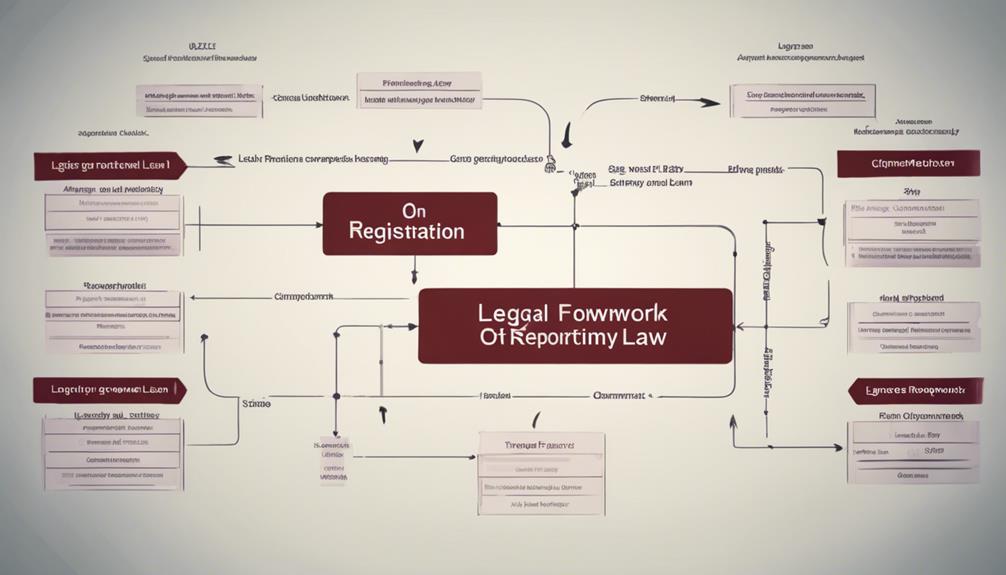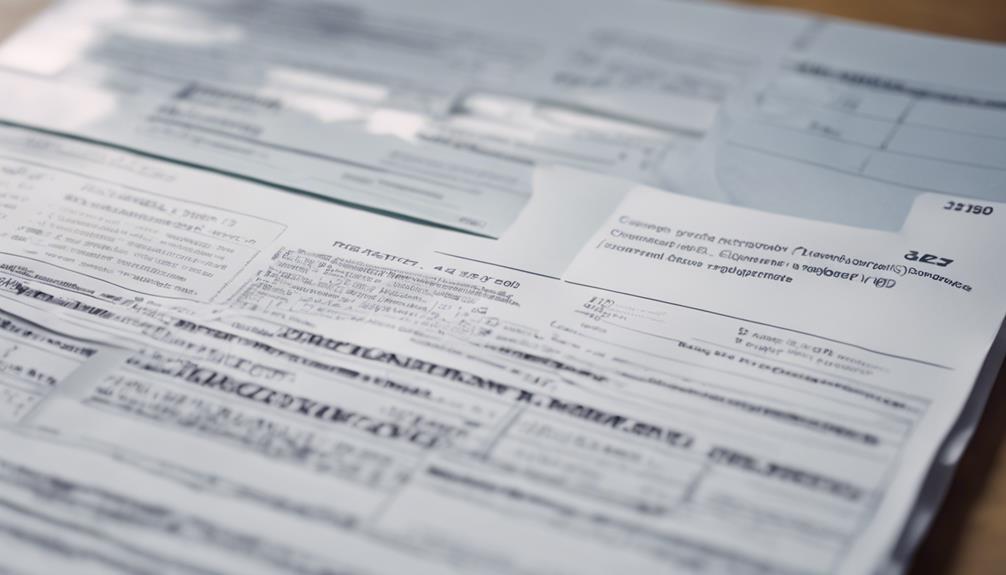In the realm of international business, adherence to local regulations and laws is paramount for sustainable operations. Understanding Guernsey Company Law is not just a matter of compliance; it is a strategic imperative for businesses looking to thrive in this jurisdiction.
From the incorporation process to the intricate web of director responsibilities and shareholder rights, navigating the legal landscape can be daunting.
In this guide, we will uncover the key elements that companies operating in Guernsey must grasp to ensure not just compliance, but also long-term success.
Legal Framework Overview

In understanding the legal framework surrounding Guernsey Company Law, it is essential to grasp the foundational principles that govern corporate entities within this jurisdiction. Guernsey operates under a mix of statute and common law, with the primary legislation governing companies being the Companies (Guernsey) Law, 2008. This law sets out the requirements for the incorporation, operation, and dissolution of companies in Guernsey. Additionally, the island's legal framework is influenced by English law, especially concerning matters where local legislation is silent.
Guernsey has a flexible regulatory environment that aims to attract international businesses while ensuring transparency and compliance with international standards. The Guernsey Financial Services Commission (GFSC) plays a crucial role in regulating and supervising the financial services sector, including companies, to maintain the jurisdiction's reputation as a well-regulated financial center. Moreover, Guernsey's legal system emphasizes the importance of corporate governance, accountability, and protection of stakeholders' interests to foster a business-friendly environment. Understanding these foundational principles is fundamental for ensuring compliance with Guernsey Company Law.
Incorporation Process
Understanding the foundational principles of Guernsey Company Law provides a solid groundwork for navigating the incorporation process with compliance and efficiency. The incorporation process in Guernsey involves several key steps that must be followed meticulously to establish a company successfully.
To begin, selecting a unique company name that complies with the legal requirements is essential. Once the name is approved, the next step is to prepare the company's memorandum and articles of association, outlining its internal governance structure. These documents must be submitted to the Guernsey Registry along with the necessary forms and fees.
Additionally, the appointment of directors and company secretary, as well as the issuance of shares, must be documented accurately. Moreover, ensuring compliance with anti-money laundering regulations and Know Your Customer (KYC) requirements is crucial throughout the process. By adhering to these steps and requirements diligently, companies can incorporate in Guernsey smoothly and in accordance with the law.
Director Responsibilities

With utmost diligence and legal acumen, directors in Guernsey shoulder significant responsibilities in upholding corporate governance standards. Directors are tasked with acting in the best interests of the company, exercising their powers for proper purposes, and avoiding conflicts of interest. They must ensure compliance with the company's memorandum and articles of association, as well as with Guernsey's company laws and regulations. Moreover, directors are responsible for overseeing the company's financial affairs, maintaining accurate and transparent financial records, and preparing annual financial statements in accordance with applicable accounting standards.
In addition to their financial duties, directors must also consider the interests of the company's employees, stakeholders, and the wider community. They are expected to make informed decisions, assess risks, and promote the long-term success of the company. Directors should actively participate in board meetings, provide strategic guidance, and monitor the company's performance. By fulfilling these responsibilities with integrity and skill, directors play a crucial role in safeguarding the company's reputation and ensuring its sustained growth and compliance with Guernsey company law.
Shareholder Rights
Shareholder rights play a pivotal role in the corporate governance framework of Guernsey companies, ensuring transparency and accountability in decision-making processes. In Guernsey, shareholders are granted certain fundamental rights that empower them to participate in key company decisions and protect their interests. These rights include the ability to vote on significant corporate matters such as the appointment and removal of directors, changes to the company's constitution, and major transactions. Shareholders also have the right to receive dividends, inspect corporate records, and bring derivative actions on behalf of the company if necessary.
Moreover, Guernsey company law mandates that shareholders be treated fairly and equally, irrespective of the size of their shareholdings. This principle helps safeguard minority shareholders from being marginalized in decision-making processes. Additionally, shareholders have the right to convene general meetings, where they can express their views, raise concerns, and hold the company's management accountable. Overall, the recognition and protection of shareholder rights are essential for maintaining a balanced and transparent corporate governance framework in Guernsey.
Reporting and Disclosure Requirements

Incorporating stringent reporting and disclosure requirements is imperative for ensuring transparency and accountability within Guernsey companies. Guernsey company law mandates that all companies, regardless of their size, must prepare annual financial statements in accordance with the appropriate accounting standards. These financial statements provide a comprehensive overview of the company's financial position, performance, and cash flows during the reporting period. Additionally, companies are required to file annual returns with the Guernsey Registry, disclosing information such as changes in share capital, details of directors and shareholders, and the registered office address.
Furthermore, Guernsey companies must maintain proper accounting records to accurately reflect their financial transactions and enable the preparation of financial statements that comply with regulatory standards. The directors of Guernsey companies have a duty to ensure that the financial statements present a true and fair view of the company's financial position. Non-compliance with reporting and disclosure requirements can result in penalties and potential legal consequences, underscoring the importance of adhering to these regulations to uphold transparency and accountability.
Corporate Governance Guidelines
Ensuring effective corporate governance is essential for the sustainable operation and management of Guernsey companies. Corporate governance guidelines in Guernsey provide a framework for decision-making, outlining the responsibilities of directors, shareholders, and other stakeholders. These guidelines aim to promote transparency, accountability, and integrity within organizations, ultimately enhancing investor confidence and protecting the interests of all parties involved.
Key aspects of corporate governance in Guernsey include the establishment of a board of directors with a diverse range of skills and experience, the separation of powers between management and oversight functions, and the implementation of robust internal controls and risk management processes. Companies are encouraged to adopt best practices in corporate governance, such as regular board evaluations, transparent financial reporting, and ethical behavior standards.
Compliance Monitoring Procedures

Effective compliance monitoring procedures are vital for ensuring adherence to regulatory requirements and internal policies within Guernsey companies. These procedures involve systematically reviewing and evaluating various aspects of the company's operations to identify any potential non-compliance issues.
One key aspect of compliance monitoring procedures is conducting regular internal audits to assess the company's compliance with relevant laws and regulations. These audits help in identifying any gaps or weaknesses in the company's compliance framework, allowing for timely corrective action to be taken. Additionally, implementing robust reporting mechanisms that encourage employees to report any potential compliance breaches can help in detecting issues early on.
Furthermore, establishing clear escalation protocols for handling identified compliance issues is essential to ensure that appropriate actions are taken promptly. Regular training and awareness programs for employees on compliance requirements can also aid in fostering a culture of compliance within the organization. Overall, effective compliance monitoring procedures are crucial for safeguarding the reputation and integrity of Guernsey companies.
Regulatory Updates and Changes
Given the dynamic nature of regulatory landscapes, staying abreast of regulatory updates and changes is imperative for Guernsey companies to maintain compliance and adapt their operational practices accordingly. Keeping up-to-date with regulatory developments ensures that companies remain compliant with the latest legal requirements, which helps mitigate risks and potential penalties for non-compliance.
In Guernsey, regulatory updates can stem from various sources, including changes in legislation, updates from regulatory bodies such as the Guernsey Financial Services Commission (GFSC), and international regulatory standards. These updates may impact areas such as reporting requirements, corporate governance practices, anti-money laundering procedures, and data protection measures.
To effectively navigate regulatory changes, Guernsey companies should establish robust mechanisms for monitoring and implementing updates. This may involve appointing compliance officers, conducting regular compliance audits, providing staff training on new regulations, and engaging legal counsel for interpretation and guidance. By proactively engaging with regulatory updates, Guernsey companies can demonstrate their commitment to compliance and adapt their operations to meet evolving regulatory standards.
Penalties for Non-Compliance

Non-compliance with Guernsey company law can result in significant penalties and repercussions for businesses operating within the jurisdiction. Companies failing to adhere to the regulatory framework may face severe consequences imposed by the Guernsey Financial Services Commission (GFSC) or the Royal Court of Guernsey. Penalties for non-compliance can include fines, suspension or revocation of licenses, director disqualifications, and even criminal prosecution in cases of serious breaches.
Financial penalties for breaches of Guernsey company law vary depending on the severity of the violation and can range from monetary fines to substantial penalties. The GFSC has the authority to impose fines on companies and individuals found to be in breach of regulatory requirements. In cases where non-compliance poses a significant risk to the financial system or public interest, the GFSC may take swift and decisive enforcement action.
It is essential for companies operating in Guernsey to ensure strict compliance with all relevant laws and regulations to avoid facing these penalties and safeguard their reputation and operations within the jurisdiction.
Frequently Asked Questions
Can a Guernsey Company Operate in Other Jurisdictions Without Having to Comply With Local Laws and Regulations?
A Guernsey company operating in other jurisdictions must comply with local laws and regulations of those jurisdictions. International operations require adherence to varying legal frameworks to ensure compliance and avoid legal consequences.
What Are the Tax Implications for a Guernsey Company With Foreign Shareholders?
Tax implications for a Guernsey company with foreign shareholders depend on various factors like residency status, double tax treaties, and types of income. Understanding these considerations is vital for ensuring compliance with international tax laws and optimizing tax efficiency.
Are There Any Restrictions on the Types of Businesses That Can Be Incorporated in Guernsey?
In Guernsey, there are regulations governing the types of businesses that can be incorporated. Certain activities like banking, insurance, and collective investment schemes require specific licenses. The Guernsey Registry provides guidance on permissible business activities for incorporation.
How Does Guernsey Company Law Address Issues Related to Data Protection and Privacy?
Data protection and privacy are fundamental considerations in modern business practices. Guernsey company law addresses these issues by providing clear guidelines and regulations to safeguard sensitive information, ensuring compliance with international standards and protecting stakeholders' rights.
Is It Possible for a Guernsey Company to Convert Into a Different Type of Legal Entity, Such as a Partnership or Trust?
Yes, in Guernsey, a company can convert into a different type of legal entity, such as a partnership or trust. This process involves specific legal procedures and requirements that need to be followed to ensure a smooth transition.
Conclusion
In conclusion, Guernsey company law provides a comprehensive framework for compliance with legal requirements governing the incorporation, operation, and governance of companies.
Directors have clear responsibilities, shareholders possess specific rights, and reporting and disclosure obligations are strictly enforced.
Compliance monitoring procedures are in place to ensure adherence to regulations, with penalties imposed for non-compliance.
It is essential for companies operating in Guernsey to stay updated on regulatory changes to avoid legal repercussions.










